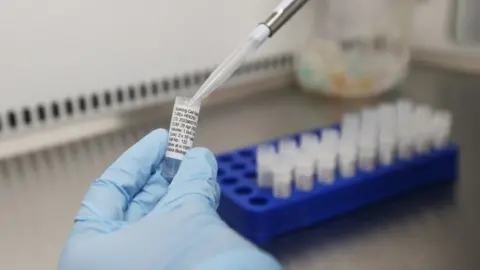Covid-19: UK volunteers could be given virus to test vaccine
 Reuters
ReutersThe UK could be the first country in the world to carry out Covid "challenge trials" - where healthy volunteers are deliberately infected with coronavirus to test possible vaccines.
It is understood the studies - first reported by the Financial Times - would be conducted in London.
The UK government said it was holding discussions about developing a vaccine through such "human challenge studies".
No contracts have yet been signed, the BBC understands.
'Out of the pandemic'
Alastair Fraser-Urquhart, an 18-year old university student, is planning on volunteering for the trial if it is given the green light to go ahead. He helps run the advocacy group, 1Day Sooner.
He told the BBC Radio 4 Today programme: "I think the challenge trial has the potential to save thousands of lives and really bring the world out of the pandemic sooner. It is just something that made instant sense to me."
Speaking on the same programme, Prof Peter Horby of Oxford University, said he thought the trial was a good idea that had the real potential to advance science and get a better understanding of the disease.
He said: "We now know the risk in a healthy young adult with no underlying conditions is extremely low.
"We suspected this before, but we really did not have the strength of evidence to go forward with challenging people with the virus - but now I think there is clear data.
"The second thing that has changed is there are now some treatments that have been shown to have a benefit, so in the likely event that a a challenged person does becomes unwell, there are drugs that can be given very early to help control the disease."
Prof Horby said it is likely volunteers would be observed very closely and their immune systems would be monitored to see how they respond to the virus.

'A risk volunteers are willing to take'

There are - perhaps surprisingly - lots of young, healthy people ready to volunteer for coronavirus challenge trials.
It would be a way of finding out, almost immediately, whether a vaccine works.
And it could help speed the selection of the promising coronavirus vaccines.
The health of the volunteers would be monitored round the clock at a clinical research facility in London.
I understand that no contracts for the study, which would be government funded, have yet been signed, but the hope is they could begin in January.
What's been holding things up are ethical considerations - challenge studies have been used to test vaccines for flu, cholera and typhoid, but in each case there was an effective treatment to prevent volunteers from falling ill.
With coronavirus, there would be an added level of risk - but it's one that volunteers say they are willing to take.

A government spokesman said discussions around challenge trials were ongoing as part of the overall consideration of potential avenues for coronavirus research.
Work to find a coronavirus vaccine is under way at breakneck speed around the globe.
There are currently 36 vaccines in clinical trials, including one being developed by the University of Oxford that is already in an advanced stage of testing.
A successful vaccine would provide some protection against the virus by training people's immune systems to fight it so they should not become sick.
This would allow lockdowns to be lifted more safely, and social distancing to be relaxed.


- THE R NUMBER: What it means and why it matters
- SOCIAL DISTANCING: What are the rules now?
- FACE MASKS: When do I need to wear one?
- LOOK-UP TOOL: How many cases in your area?


News of the potential trials comes as the number of daily reported cases rose by a quarter on Wednesday to 6,178, the latest government figures showed, up 1,252 since Tuesday. Some 37 deaths were also announced.
Tighter restrictions were announced across the UK on Tuesday, including a 22:00 closing time for pubs in England starting on Thursday. Scotland is introducing similar measures, with pubs and restaurants having to close at 22:00 BST from Friday, while in Wales restrictions are limited to stopping alcohol sales at 22:00 from Thursday.
Other measures in England include people being told to work from home if they can, rules on face coverings being expanded and the number of people allowed at weddings being halved.


- LITTLE MIX: THE SEARCH: Coming soon - a brand new show to solve your entertainment needs
- HOW CAN I RELAX?: Soothe your soul with Mindful Escapes

